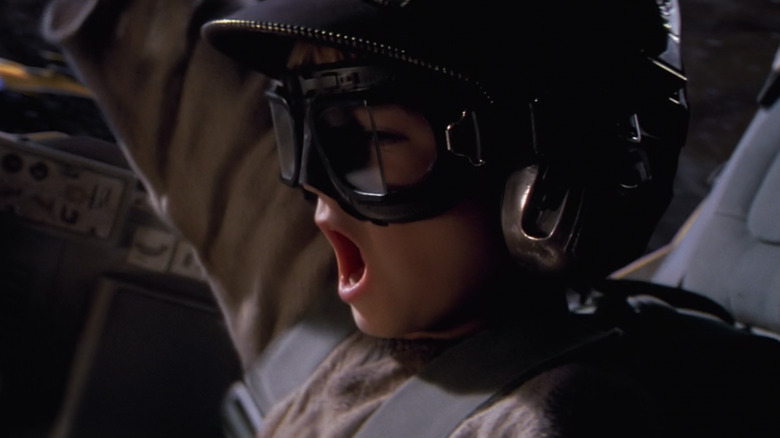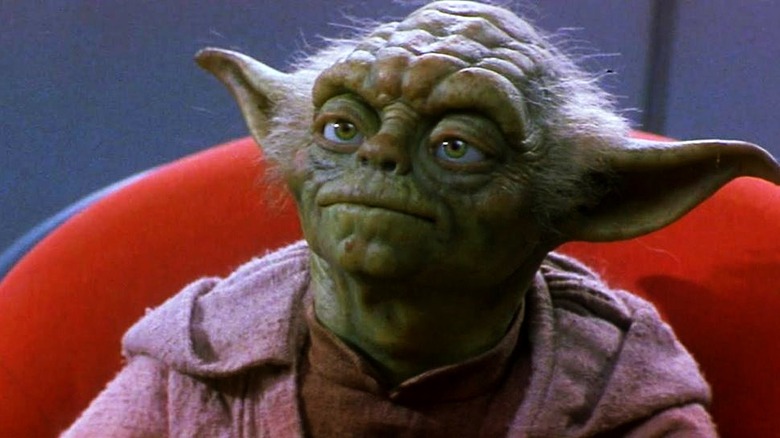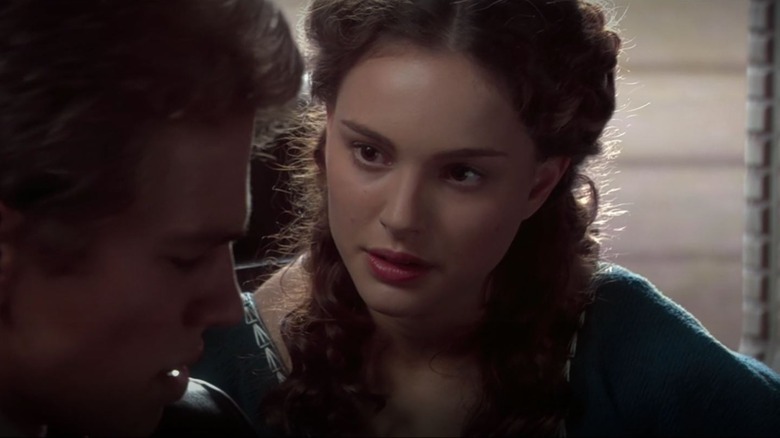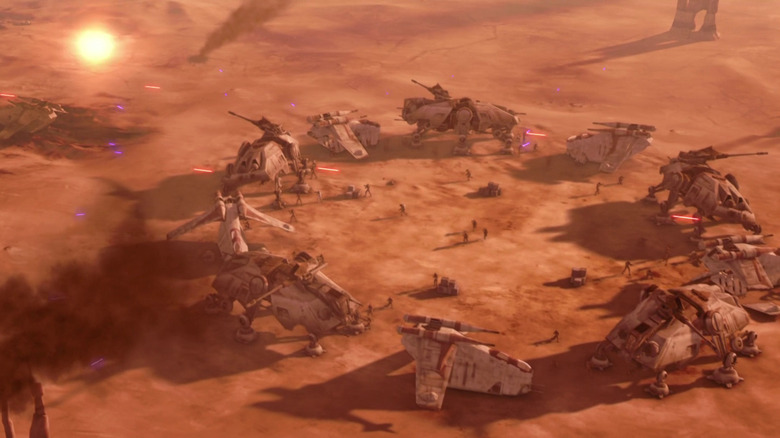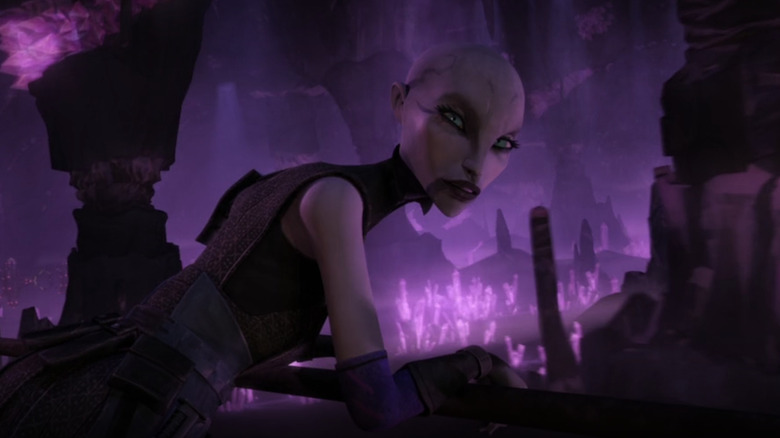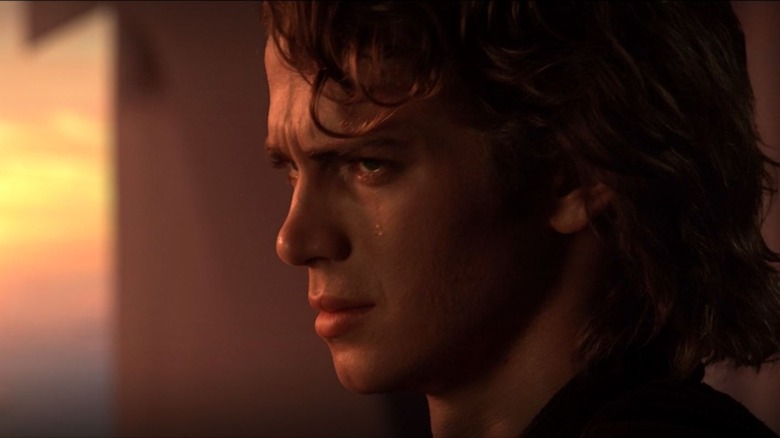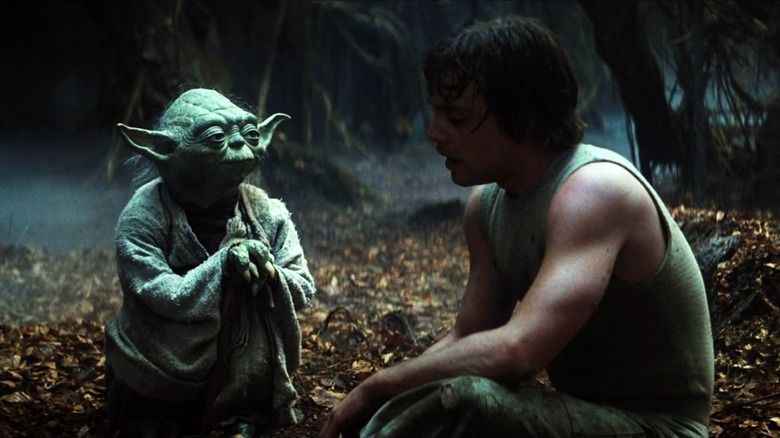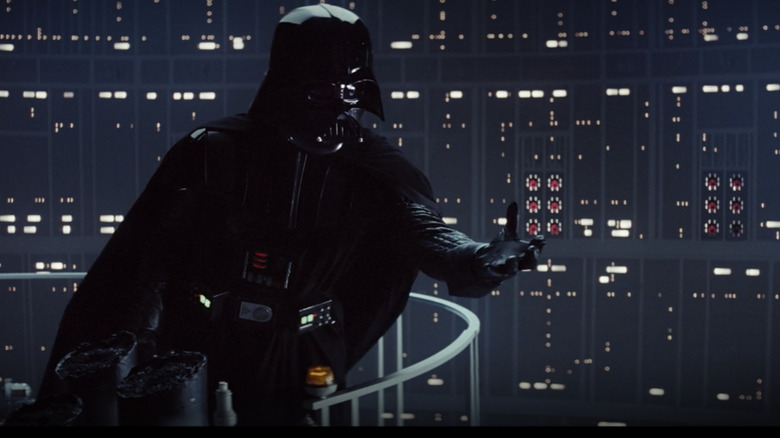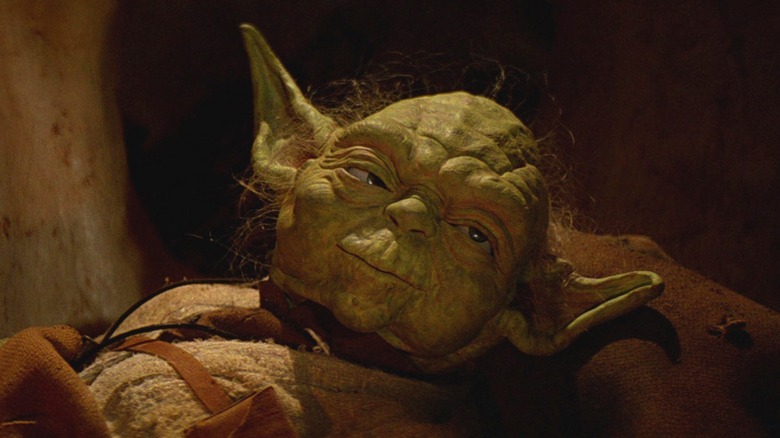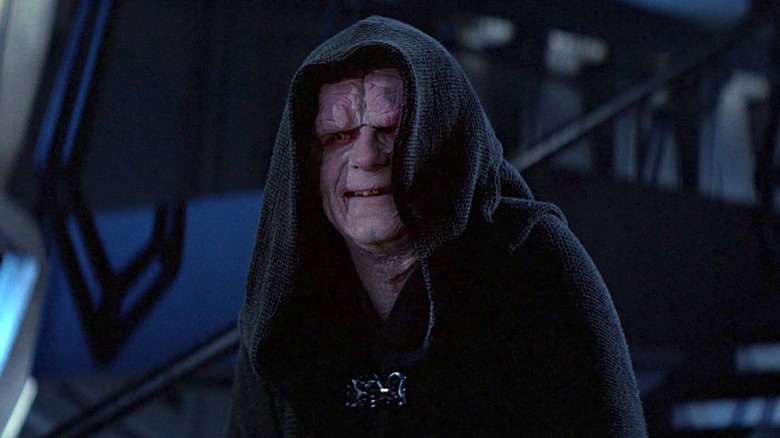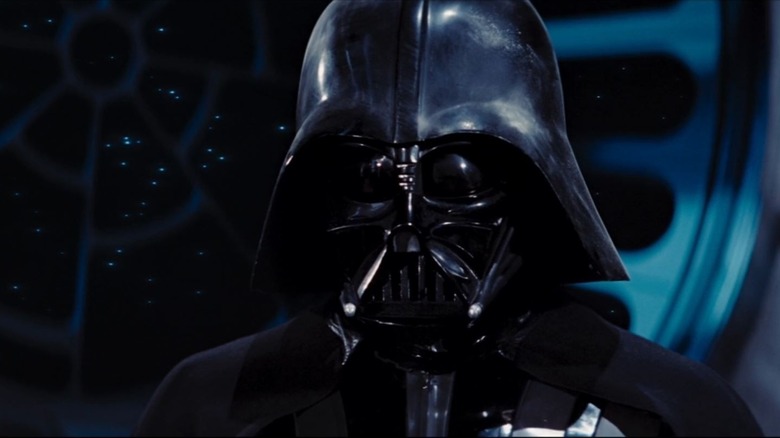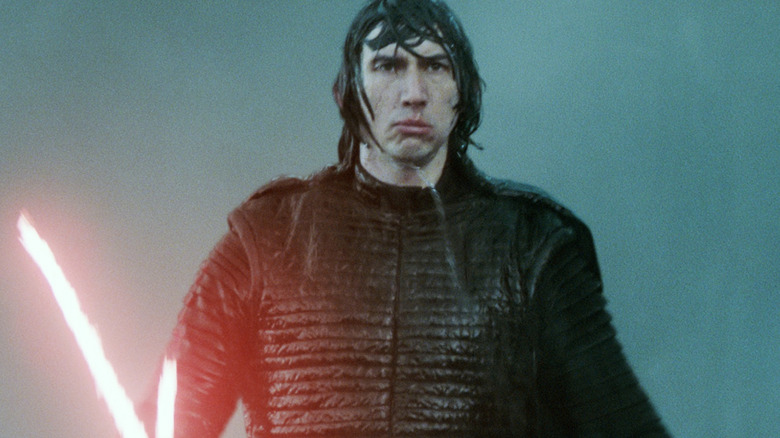Advice We Learned From Star Wars That You Should Totally Avoid
It's one of the biggest franchises in human history. Dread it, run from it, "Star Wars" still arrives, regularly in theaters and on Disney+. As a morality tale hidden within the realm of science fantasy, the series has given its fans some pretty hefty pieces of wisdom over the years, sage advice that can help anybody who hears it become a better version of themselves.
It's also delivered some ethics-sinking clunkers. Like most franchises, "Star Wars" will always have some questionable things that fans are better off ignoring, and it's taught some lessons that many fans will need to outright reject, lest they fall prey to the same mistakes made by many of the franchise's most famous and important characters. These are pieces of "wisdom" that "Star Wars" lovers grew up hearing over and over again, but that will need to be totally avoided by anyone who wishes to lead a happy and successful life.
Daring, dangerous, reckless plans always succeed
When their backs are against the wall and the odds are completely against them, the heroes can still deliver a win if they are simply brave enough. In the "Star Wars" universe, as long as one's cause is just, then their plans will succeed, no matter how flawed or foolish those plans may be. For example, in "The Phantom Menace," a literal child saves Naboo from a droid army with a ship he's never seen before by flying it straight inside the enemy super carrier and destroying it from the inside. Similar things happen with most of Anakin's plans during "The Clone Wars" and in both Rebel attacks on the Death Stars.
It may not go well at first, but the good guys always win in the end, no matter how foolhardy their plan of attack, and the issues with this line of thinking are placed on full display in the only major "Star Wars" entry that pushes back on this idea: "The Last Jedi." Throughout the film, every daring plan the Resistance concocts fails. Poe's assault on the dreadnought leaves the Resistance fleet defenseless. Finn and Rose's efforts to disable the system tracking the Resistance flagship lead to nothing, and Admiral Holdo's hyperspace maneuver fails to disguise the Resistance's attempts to flee, only managing to briefly slow the First Order down. Courage and a just cause will only get a person so far without a good plan to back it up.
Fear leads to anger
It's one of Jedi Grandmaster Yoda's most famous lines: "Fear is the path to the Dark Side. Fear leads to anger, anger leads to hate, hate leads to suffering." Though there is merit to what the ancient wizard says, the advice is ultimately more damaging than it is helpful.
First, there are issues because of Yoda's use of absolutes (which only the Sith are supposed to deal in). Fear doesn't have to lead to the Dark Side, nor does it always lead to anger, nor does anger always spring from fear. Anger can come from a variety of sources, and fear is inescapable. Every Jedi who didn't fall to the Dark Side probably felt fear at some point, but they stayed with the light.
Second, why and when a person feels fear matters far less than his or her reaction to it, and that's where the real "bad advice" angle comes in here. The Jedi teach their members to suppress and ignore their emotions rather than deal with, confront, and work through them as one would during therapy. Humans, and presumably most alien species, can't just "not feel fear." As the phrase goes, courage is not the absence of fear; courage is doing what one needs to do despite her or his fear. The real lesson for fans is to not let fear control them, to overcome its hold over them, and to not let it dictate their actions, but that lesson is completely lost here.
To be angry is to be human
"To be angry is to be human." In "Attack of the Clones," that single sentence is the bulk of Padmé Amidala's response to Anakin Skywalker raving about murdering a bunch of children. It's not a great look.
The line is spoken on Tatooine after Skywalker destroys the Tusken village in revenge for his mother's death. After bringing her body back to the Lars homestead, Anakin screams one of the most memed lines in the franchise: "I killed them... Every single one of them. And not just the men, but the women and the children, too. They're like animals, and I slaughtered them like animals! I hate them!"
Faced with this near-psychotic outburst from a teenager who's been creeping her out for most of their time together, one might be forgiven for expecting Padmé to flee in horror. But she doesn't. What she does do is comfort him. Anakin has just admitted to committing mass murder, and she waves it away.
It's not that the statement is wrong, per se, but it's application here is extremely abhorrent and it's a fairly useless statement without some follow up that amounts to something like "it's what you do with your anger that defines you." And what Anakin did is murder a bunch of children. Is it any wonder that he became Darth Vader?
Believe in yourself or no one else will
"Star Wars: The Clone Wars" took the classic morality tale idea of the original trilogies and adapted it to serialized storytelling by beginning every single episode with what is supposed to be either sage advice, a wise saying, or a proverb. Many of them are fine, some are even insightful, but more than a few are downright distressing. For example, Season 2's "Landing at Point Rain" opens with this: "Believe in yourself or no one else will."
Now, maybe this could apply to maintaining a confident leadership style, but that's not part of the advice. The idea that no one will believe in someone unless that person believes in themselves denies one of the foundational strengths of friendships and encouragement during dark times. It's why so many films and stories have a scene where, in a moment of crisis, the protagonist doesn't believe they can do what's necessary, only for a friend to convince them otherwise. One of the best parts of having loved ones is having someone who can tell you that you're capable, even when you're struggling to believe it.
Who we are never changes, who we think we are does
This is another piece of advice from the beginning of an episode of "Clone Wars," this time from the Season 4 episode "Bounty." Unfortunately for the quote, people do change — quite frequently and constantly, in fact, though it's often a slow enough process that it can be difficult to notice. The idea that when someone changes, the only thing changing is their perception of themselves is pretty simplistic, and doesn't even stand up within "Star Wars," let alone the real world.
For example, though Anakin Skywalker and Darth Vader share some traits, they are wildly different characters, despite being the same biological organism. Anakin was kind and caring. He tried to help those around him, even when he didn't know them, and strove to protect the innocent. Darth Vader cares nothing for such things and is more than willing to destroy anybody who gets in his way, regardless of who they are. The idea that Anakin's transformation into Darth Vader was just a change in "who he thought he was" is absurd. There's a reason that Obi-Wan didn't think he was lying when he let Luke think that Anakin and Vader were two separate people.
There is no emotion, there is peace
The first line of the Jedi Code is "There is no emotion, there is peace," and it's a load of rubbish. The Jedi have chosen to implement a prohibition on emotions, whether they are positive or negative. Attachments, marriage, and love are all forbidden, because even positive emotions can lead to the negative ones and, thus, the Dark Side.
But suppressing one's emotions isn't possible forever, and when Anakin dreams of Padmé's death in "Revenge of the Sith," he goes to Yoda, who basically tells him to stop feeling. Anakin can't do that, so he turns to the Sith Lord Palpatine instead, and we know how that ended. Anakin was taught to ignore his emotions, but if he had been taught to control them and work through them, the Jedi may never have fallen.
The 2003 RPG "Knights of the Old Republic" expresses this through Jolee Bindo, a former Jedi who left after his wife died, but never joined the Dark Side: "Love doesn't lead to the Dark Side. Passion can lead to rage... but passion is not the same thing as love. Controlling your passions while being in love — that's what they should teach you to beware. But love itself will save you, not condemn you."
By rejecting all emotions outright, Jedi are not just blocking the benefits and strengths of good emotions, they are leaving themselves incredibly vulnerable to negative ones, and this choice ultimately leads to their downfall.
Do. Or do not. There is no try
While exceedingly memorable, most of the positive applications of Yoda's most famous line of dialogue rely on assumptions that don't actually fit the scene itself. For starters, Yoda berates Luke after he fails to lift the X-Wing on his first attempt. Yoda is asking someone who's barely started training to do something extraordinarily difficult, and his advice in the aftermath completely misses the point.
Everybody has to "try" to actually do anything, and in the scene in question, the issue wasn't that Luke only "tried" instead of "did," but that he didn't actually try because he had already decided beforehand that he would fail. That fear of failure was the issue, and that isn't captured in the quote at all. The advice doesn't even address it.
Anyone going through life will find themselves doing their best and still failing. As Captain Picard once wisely said in "Star Trek: The Next Generation," "It is possible to commit no mistakes and still lose. That is not a weakness. That is life." At the end of the day, there is just so much more in between "do" and "do not" than "try," and "trying" wasn't even the issue at play.
Search your feelings, you know it to be true
Variations on this line are said throughout many of "Star Wars'" vast array of releases, and it's a poor piece of advice — but not for the reason many fans may think. Though the line is famously uttered by both Darth Vader and the Emperor, it's also spoken by several Jedi, which many believe violates the Jedi's infamous opinions of emotions and attachments. This isn't really the case, however, as "Star Wars" doesn't really mean the emotional type of feeling in this context, but is instead far more interested in intuition. Darth Vader doesn't ask Luke to rely on his emotions after revealing the truth of his fatherhood; he asks Luke to check his gut feeling and see if he really doubts the Sith Lord's claims.
But gut feelings are often unreliable. Though there are plenty of anecdotes about situations where such intuitions were right, there are just as many where such a feeling was completely absent or inaccurate. Trusting these things as completely as "Star Wars" does would be a mistake for any fan in the real world.
Once you start down the dark path, forever will it dominate your destiny
After freeing Han Solo from Jabba's palace and sending Boba Fett flying into the Sarlacc Pit, Luke Skywalker returns to Dagobah one last time to visit Yoda and finish his training. Unfortunately, the wizened Jedi Master is on his deathbed, but he does have one final piece of advice for young Luke: "Once you start down the dark path, forever will it dominate your destiny."
The only problem is, that's a load of hogwash. Nothing is forever, and change is always possible, something that Darth Vader shows audiences later in the same film. In fact, there are many, many stories in "Star Wars" of characters who fall to the Dark Side or serve the cause of evil, only to be redeemed. The fact that this redemption trope is so common in the franchise speaks to the issues with this piece of advice. The impact and the consequences of one's evil actions can remain, and likely will, but that's not the same thing as forever dominating your destiny.
Let the hate flow through you
This one's a bit of a cheat in that the series isn't actually trying to give this to its viewers as advice, but it's relevant enough to include anyway, especially for any fans of the Sith that might take that passion a little too seriously. During the grand finale of "Return of the Jedi," the Emperor has Luke Skywalker, the final threat to his rule, trapped on the Death Star with both himself and his apprentice, Darth Vader. Palpatine sees the confrontation going one of two ways: Either Skywalker is killed and the status quo is forever maintained, or Darth Vader is killed by a corrupted Luke who becomes the Sith Lord's brand-new apprentice. Either way, it's a win, so Sidious is very free with his evil encouragements, and "Let the hate flow through you" is one of the most famous.
Unfortunately, this is terrible advice that has led to the downfall of the Sith more than once. Hate is, by its very nature, corrupting and destructive to both the one wielding it and everything around him or her. It might grant power in the short term, but it warps the mind, distracts focus, and ultimately leads to the Emperor's death. Palpatine's own hatred of the Jedi is so all-consuming that he focuses too heavily on killing Luke, failing to realize that Anakin's love for his son has turned Vader back to the light.
All it takes is one good deed to redeem a lifetime of evil
Unfortunately, there's one other common trope in "Star Wars" that fans need to unlearn: that one good deed is all it takes to redeem a lifetime of evil. Even though Vader repeatedly murdered large numbers of children, killing the Emperor to save his son is enough for the dark lord to become one with the Force and appear alongside Yoda and Obi-Wan during the party on Endor. But that's just not how it works — or at least, it's not how it should work. "Star Wars" leans heavily on the idea that every passing second is a second chance to change oneself for the better, but for that foundational element to hold true, redemption must be possible, no matter how far gone the person in question is. But no change of heart will bring the murdered back from the dead or restore the planets that were destroyed.
Anakin might be at peace now, but what about the many friends, family, and loved ones of the thousands of people he has killed both personally and indirectly? A lifetime of good would likely fail to make up for the evil Vader committed during his 20-year reign over the galaxy, yet the series would have you believe that just one is sufficient.
In difficult times, fear is a surer bet
After digging his way out of the Sarlacc Pit, Boba Fett decides that he's done working for idiots like Jabba the Hutt who will get him killed fighting battles (like the one against the Rebel Alliance) that could have been avoided. To this end, he recruits Master Assassin Fennec Shand to become his partner in his bid to become the crime lord of Tatooine. But he also discovers that carrying out that plan is far more complicated than he expected. Part of the reason for this is Fett's desire to rule with respect rather than intimidation, but Fennec points out that "In difficult times, fear is a surer bet."
This quote forms yet another heart of the "Star Wars" morality tale. The prequel trilogy deals heavily with the theme of security vs freedom, a constant conflict of priorities that debates when, if ever, the promise of safety trumps the ideal of liberty. That theme continues throughout the broader "Star Wars" story, as the freedom-filled democracies of the Old and New Republics clash against the wanton corruption of the Trade Federation, the crushing authoritarianism of the Empire, and the murderous zealotry of the First Order. By trying to rule with respect, Boba is attempting to break this cycle within the Hutts' cartel system and instead institute one that will save lives, make more money, and be founded on mutual cooperation rather than constant mistrust.
Let the past die. Kill it if you have to
"Let the past die," Kylo Ren proclaims. "Kill it if you have to." This is his advice to Rey as he attempts to dissuade her from receiving Luke Skywalker's Jedi training. According to Ren, Rey is letting the past control her. His solution? Destroy it so that it can't. Unfortunately for the former and future Ben Solo, there's a reason that the phrase, "Those who fail to learn from history are doomed to repeat it" is as popular as it is.
Yes, it's unhealthy and problematic to be completely chained to the past and let it dictate your actions, but the complete rejection of it and its lessons is too far in the other direction. Not learning the lessons of history is a large reason that both the New Republic and the New Jedi Order end up in the situations they're in currently. Meanwhile, in "The Last Jedi," Kylo's own determination to kill the past is directly responsible for the Resistance's survival. He becomes so distracted by the possibility of killing Luke that his past ends up trapping him, giving Rey enough time to get the remaining rebels to safety.

